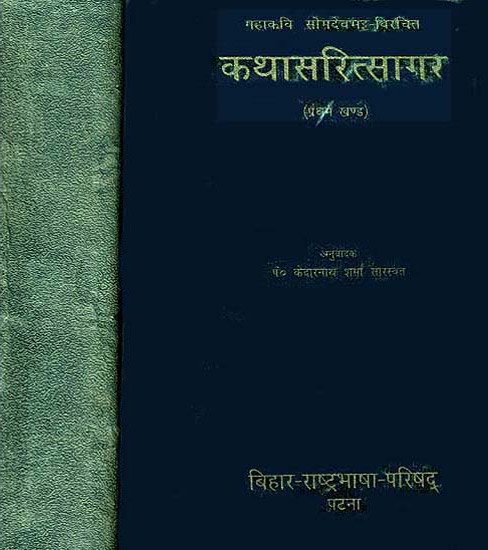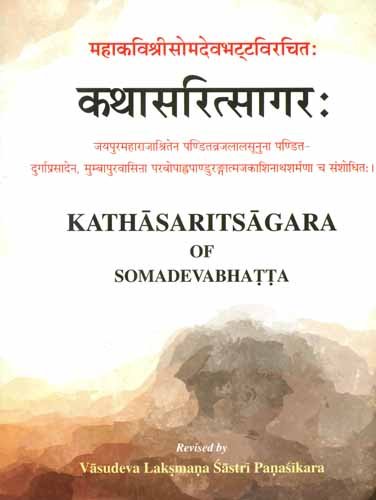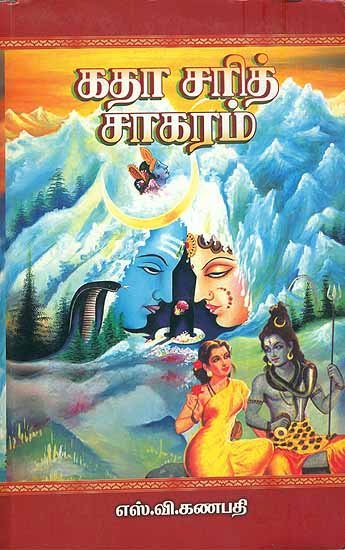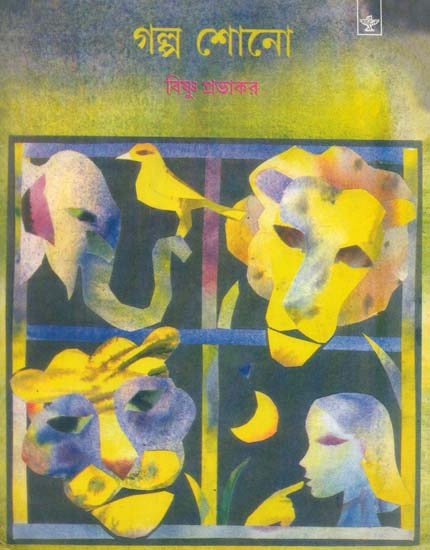Kathasaritsagara [sanskrit]
by C. H. Tawney | 2014 | 226,424 words | ISBN-13: 9789350501351
The Sanskrit edition of the Kathasaritsagara referencing the English translation and grammatical analysis. Written by Somadeva and dating from the 12th century, the Kathasaritsagara (or Katha-sarit-sagara) represents an epic legend narrating the adventures of Naravahanadatta as he strives to become the destined emperor of the Vidyadharas. Alternative titles: (Kathāsaritsāgara, कथासरित्सागर, Kathā-sarit-sāgara)
Verse 6.4.105
तच् छ्रुत्वा स्थूलदत्तस् तं हरिशर्माणम् आह्वयत् ।
ह्यो विस्मृतो हृतेश्वे तु स्मृतो ऽस्म्य् अद्येति वादिनम् ॥ १०५ ॥
tac chrutvā sthūladattas taṃ hariśarmāṇam āhvayat |
hyo vismṛto hṛteśve tu smṛto 'smy adyeti vādinam || 105 ||
The English translation of Kathasaritsagara Verse 6.4.105 is contained in the book The Ocean of Story by C.H. Tawney. This book is available online or you could buy the latest edition:
Read online Buy now! The English translation by C.H. Tawney (2014)
Glossary of Sanskrit terms
Note: This extracts Sanskrit terms and links to English definitions from the glossary, based on an experimental segmentation of verse (6.4.105). Some terms could be superfluous while some might not be mentioned. Click on the word to show English definitions.
Sthuladatta, Harisharman, Ahu, Ahva, Ayat, Hyah, Vismrita, Hrit, Hrita, Hriti, Adya, Iti, Vadin,
Analysis of Sanskrit grammar
Note: this is an experimental feature and only shows the first possible analysis of the Sanskrit text (Kathasaritsagara Verse 6.4.105). If the system was successful in segmenting the sentence, you will see of which words it is made up of, generally consisting of Nouns, Pronouns, Verbs, Participles and Indeclinables. Click on the link to show all possible derivations of the word.
- Line 1: “tac chrutvā sthūladattas taṃ hariśarmāṇam āhvayat ”
- tac -
-
- Cannot analyse chrutvā*st
- sthūladattas -
-
sthūladatta (noun, masculine)[nominative single]
- tam -
-
ta (noun, masculine)[adverb], [accusative single]ta (noun, neuter)[adverb], [nominative single], [accusative single]tā (noun, feminine)[adverb]tan (noun, masculine)[adverb]sa (noun, masculine)[accusative single]
- hariśarmāṇam -
-
hariśarman (noun, masculine)[accusative single]
- āhva -
-
āhū (noun, feminine)[compound], [adverb], [vocative single]āhva (noun, masculine)[compound], [vocative single]āhva (noun, neuter)[compound], [vocative single]
- ayat -
-
ayat (noun, masculine)[compound]ayat (noun, neuter)[nominative single], [vocative single], [accusative single]
- Line 2: “hyo vismṛto hṛteśve tu smṛto 'smy adyeti vādinam ”
- hyo* -
-
hyaḥ (indeclinable adverb)[indeclinable adverb]hyaḥ (indeclinable)[indeclinable]
- vismṛto* -
-
vismṛta (noun, masculine)[nominative single]
- hṛte -
-
hṛt (noun, masculine)[dative single]hṛt (noun, neuter)[dative single]hṛta (noun, masculine)[locative single]hṛta (noun, neuter)[nominative dual], [vocative dual], [accusative dual], [locative single]hṛtā (noun, feminine)[nominative dual], [vocative single], [vocative dual], [accusative dual]hṛti (noun, feminine)[vocative single]√hṛ -> hṛta (participle, masculine)[locative single from √hṛ class 1 verb]√hṛ -> hṛta (participle, neuter)[nominative dual from √hṛ class 1 verb], [vocative dual from √hṛ class 1 verb], [accusative dual from √hṛ class 1 verb], [locative single from √hṛ class 1 verb]√hṛ -> hṛtā (participle, feminine)[nominative dual from √hṛ class 1 verb], [vocative single from √hṛ class 1 verb], [vocative dual from √hṛ class 1 verb], [accusative dual from √hṛ class 1 verb]
- śve -
-
- tu -
-
tu (indeclinable particle)[indeclinable particle]
- Cannot analyse smṛto'smy*ad
- adye -
-
adya (indeclinable adverb)[indeclinable adverb]adya (noun, masculine)[compound], [vocative single], [locative single]adya (noun, neuter)[compound], [nominative dual], [vocative single], [vocative dual], [accusative dual], [locative single]adyā (noun, feminine)[nominative single], [nominative dual], [vocative single], [vocative dual], [accusative dual]√ad (verb class 2)[present passive first single]
- iti -
-
iti (indeclinable particle)[indeclinable particle]iti (noun, feminine)[compound], [adverb]
- vādinam -
-
vādin (noun, masculine)[accusative single]
Other editions:
Also see the following editions of the Sanskrit text or (alternative) English translations of the Kathasaritsagara Verse 6.4.105
Kathasaritsagar
by Kedarnath Sharma Saraswat (2005)
The Only Edition with the Sanskrit Text and its Hindi Translation (An Old and Rare Book) Set of 3 Vol.
Buy now!
Kathasaritsagara of Somadeva Bhatta (Sanskrit Text Only)
by Vasudeva Laksmana Sastri (2013)
Katha Sarit Sagar in Marathi
by H. A Bhave (1995)
Set of 5 Volumes; Published by Varada Books, Pune. 2256 pages (Throughout B/W Illustrations).
Buy now!
Katha Sarit Sagara (Tamil)
by S. V. Ganapati (எஸ். வி. கணபதி) (2014)
[கதா சரித் சாகரம்] Published by Alliance Publications.
Buy now!
Galpa Shono
by Abhijit Chattopadhyay (2014)
[গল্প শোনো] Galpa Shono: Bengali Translation of 'Suno Kahani From Katha Sarit Sagar'; 9788126015436; Published by Sahitya Akademi, Delhi.
Buy now!Preview of verse 6.4.105 in Bengali sript:
তচ্ ছ্রুত্বা স্থূলদত্তস্ তং হরিশর্মাণম্ আহ্বযত্ ।
হ্যো বিস্মৃতো হৃতেশ্বে তু স্মৃতো ঽস্ম্য্ অদ্যেতি বাদিনম্ ॥ ১০৫ ॥
![Kathasaritsagara [sanskrit] - book cover](/uploads/a/Katha-Sarit-Sagara.jpg)




